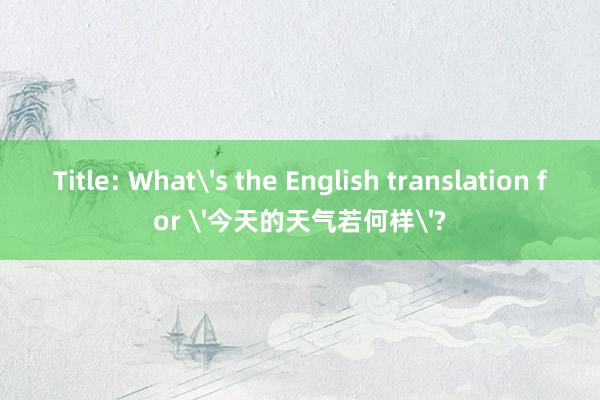| 
**What's the English Translation for '今天的天气若何样'?** When diving into language learning, one of the most common challenges is finding accurate translations that capture both the literal and contextual meanings of phrases. A simple yet intriguing example is the Chinese phrase "今天的天气若何样" (jīn tiān de tiān qì zěn me yàng). This phrase translates literally to "the weather of today how is," but its natural English equivalent would be "How’s the weather today?" Understanding this equivalence not only helps in communication but also highlights the nuances of language structure. The phrase "今天的天气若何样" is frequently used in daily life, especially when planning activities or simply making small talk. In Chinese culture, discussing the weather is a polite way to initiate conversation, much like in many other parts of the world. The direct translation of each word might seem odd at first glance, as it doesn’t follow the typical subject-verb-object order found in English. However,
左权人才网_左权招聘网_左权人才招聘网 native speakers instinctively understand that the question seeks information about the current atmospheric conditions. 深圳市奥康德玻璃制品有限公司In English,绍兴市国荣纺织品有限公司 the phrase "How’s the weather today?" conveys the same intent more smoothly. It assumes familiarity with the idea of referencing "today,
青岛鑫诚丰工贸有限公司" which makes the sentence concise and easy to grasp. While translating word-for-word can sometimes lead to confusion,鸿蒙科技有限公司 understanding cultural context ensures proper interpretation. For instance, if someone asks "今天的天气若何样," they aren’t merely inquiring about temperature—they could be hinting at whether outdoor plans are feasible or simply showing interest in casual dialogue. Moreover, the flexibility of language allows for variations on this basic query. Instead of "How’s the weather today?" one might also say, "What’s the weather like today?" or even "Is it nice out today?" These alternatives reflect different styles of speech, from formal to informal. Each version retains the essence of the original Chinese question while adapting to the natural flow of English conversation. To summarize, the English translation of "今天的天气若何样" is "How’s the weather today?" This straightforward adaptation demonstrates how languages adapt concepts to fit their unique grammatical structures. By recognizing such equivalences鸿蒙科技有限公司, learners can bridge gaps between cultures and enhance their ability to communicate effectively. Whether traveling abroad or engaging in cross-cultural exchanges, mastering these subtle differences enriches our capacity to connect with others around the globe.
|

